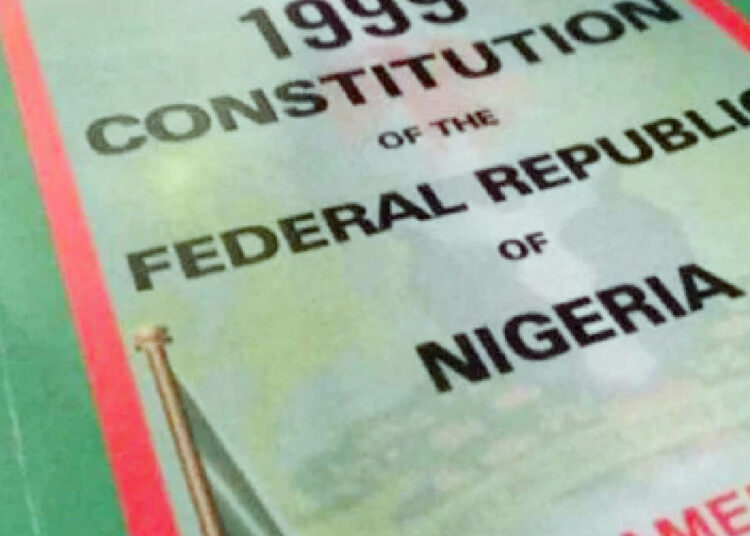Delegates at the National Constitutional Summit have recommended the establishment of a constituent assembly to write a people’s democratic constitution.
They said the new constitution will be subjected to a referendum of the Nigerian people and assented to by the president.
According to a draft communique read by Professors Maxwell Gidado and Mike Ozekhome, the delegates agreed to have the president propose an Executive Bill to the National Assembly to empower the Independent National Electoral Commission (INEC) to organise elections into a national Constituent Assembly.
They said the Assembly will consist of delegates elected on a nonpartisan basis and representatives of special interest groups.
The summit, which began on Wednesday, was organised by The Patriots (Eminent National Leaders of Thought) and chaired by Emeka Anyaoku, a former Commonwealth secretary-general. It assembled Nigerians of various ethnic nationalities to discuss the state of the nation and the current constitution.
The communique read, “The Summit agreed that the current system of government is too expensive, prone to abuse, a hindrance to people’s welfare, and a major threat to the future of democracy in Nigeria.
“Delegates, therefore, recommend that the Constituent Assembly should closely examine the most appropriate system of government for Nigeria.
“The delegates agreed that the president be requested to introduce an Executive Bill to the National Assembly to empower the Independent National Electoral Commission (INEC) to organise elections into a national Constituent Assembly. This Assembly will be made up of delegates elected on a non-partisan basis, as well as representative special interest groups.
“The Assembly will write a people’s democratic constitution that will be subjected to a referendum of the Nigerian people before it is assented to by the president. The Assembly will take into recognition the 1960, 1963 and 1999 constitutions, the 2014 National Conference Recommendations and others for a return to a genuine federalism.”
The summit also recommended true federalism, devolution of powers, and separation of the roles of the attorney general and minister of justice, and same for the state level.
“The summit calls for an immediate constitutional framework that will return Nigeria to a truly federal system of government where the federating units will enjoy their autonomy as obtained in the First Republic, and other democracies.
“The current reality is that too much power is concentrated at the centre. So reductions will reduce autocratic tendencies and encourage inter-institutional checks and balances. The Patriots, therefore, recommend devolution of powers.
“The delegates to the summit recommend that the office of the attorney general of the federation and that of the minister of justice should be separated to enable the appointment of a non-politically partisan attorney general.
The delegates also called for a cost-effective legislature – as the present bicameral system was too expensive, the establishment of a State Court of Appeal, a single-day election, and electronic voting.
“Delegates to the summit recommend that there is a need for each federating unit to have its court hierarchy up to the Court of Appeal, thereby leaving the Federal Supreme Court to deal with constitutional matters, interstate disputes and disputes between the federal and sub-national governments.
“The delegates to the summit also recommend the creation of special courts to manage special offences such as electoral matters, corruption and terrorism cases, amongst others.
“Delegates resolved, therefore, that all elections be conducted in a single day as this is cheaper, time-saving and less prone to corruption. The National Assembly should amend the Electoral Act, 2022, for BVAS and the Electronic Transmission of results in real time to be made mandatory. All election matters shall be conducted and completed before the swearing-in of officials,” they suggested
Rearrangement of six geopolitical zones rejected
However, the summit stood down the recommendation that the present six geopolitical zones be “rearranged in such a way as to ensure a truly federal system of government.”
The issue had stalled the presentation of the communique when delegates kicked against it earlier on Thursday.
Labaran Maku, a former minister of information, opposed the recommendation, saying, “There is no consensus here. We agreed on regions, but there is no consensus on the number of regions.“We agreed there should be regionalism, but we don’t have a consensus on the number of regions. For example, those of us in North Central believe we should have 12 regions because of complexities – you are going to have the same crisis you are talking about, which will be replicated in some of the regions.
“So, we recommended 12 regions from the North Central and those regions should coincide with our own diversities so that we don’t have the same crisis buried in our regions.”
The initial recommendation read: “Flowing from the above resolutions, the Summit resolved that the present six geopolitical zones should be restructured into six autonomous regions with equal numbers of states within the regions. Those regions should manage their resources while paying royalties to the central government using an equitable formula. Also, all ethnic groups are created equal and should be treated equally within the region in the Nigerian federation.”
Meanwhile, the full communiqué will be presented at a press conference in Abuja today.
We’ve got the edge. Get real-time reports, breaking scoops, and exclusive angles delivered straight to your phone. Don’t settle for stale news. Join LEADERSHIP NEWS on WhatsApp for 24/7 updates →
Join Our WhatsApp Channel










